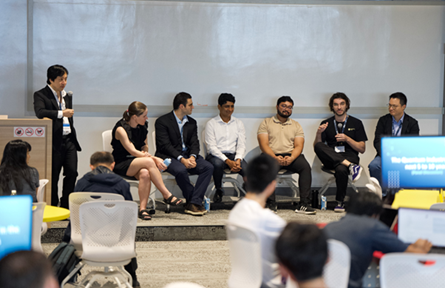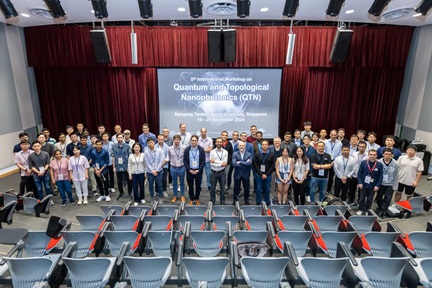3rd Annual Symposium: Innovations in anti-mycobacterial Drug Discovery
Prof Gerhard Grüber | School of Biological Sciences, NTU
Mycobacteria can be separated into tuberculosis (TB) causing Mycobacterium tuberculosis (Mtb), leprotic mycobacteria, and non-tuberculous mycobacteria (NTM). Approximately one quarter of the World’s population is infected with Mtb in latent form. TB is of enhanced concern when combined with other diseases, such as HIV and Covid-19. Similar concerns hold true for NTM infections, which are increasing in their prevalence, morbidity and mortality and frequently surpass the global incidence of TB. NTM most commonly cause pulmonary infections, especially among patients with structural airway disease like cystic fibrosis and bronchiectasis, but can also cause lymphadenitis, skin and soft tissue infection, cardiac infection, bone and joint infections, and disseminated disease. Chemotherapy is long and often toxic, includes parenteral drugs, and suffers from poor cure rates. Mtb and NTM can be considered multidrug resistant superbugs. Therefore, there is an urgent need for more efficacious, well tolerated, and oral antibiotics optimized towards the treatment of NTM diseases and TB.
The 3rd Annual Symposium: Innovations in anti-mycobacterial Drug Discovery, held from 27 to 28 May 2024 at the School of Biological Sciences (SBS) at NTU brought together speakers from around the world who have made significant advances in TB and NTM research and drug discovery. The event presented novel concepts and provided a platform for vibrant and open discussions between industry, senior scientists, postdoctoral fellows and students from academia. The symposium, opened by the Dean of the College of Science, Prof Simon Redfern, and the Chair of SBS, Prof Kanaga Sabapathy, gathered around 100 participants from 19 countries including the US, Australia, Germany, Korea, Japan, India and China. Engaging interactions with the invited speakers fostered and strengthened collaborations with the local and international researchers.
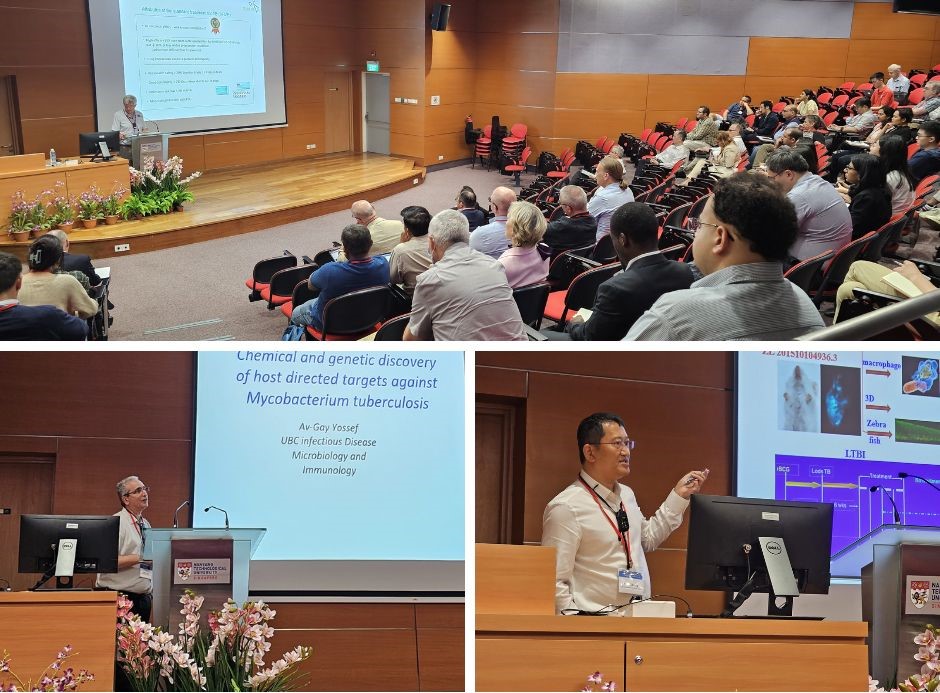 A showcase of global expertise, unveiling the latest breakthroughs in TB related research: Prof Nicholas Paton (National University of Singapore) [Top]; Prof Yossef Av-Gay (University of British Columbia) [Bottom left]; and Prof Tianyu Zhang, (Guangzhou Institutes of Biomedicine and Health, CAS) [Bottom right].
A showcase of global expertise, unveiling the latest breakthroughs in TB related research: Prof Nicholas Paton (National University of Singapore) [Top]; Prof Yossef Av-Gay (University of British Columbia) [Bottom left]; and Prof Tianyu Zhang, (Guangzhou Institutes of Biomedicine and Health, CAS) [Bottom right].
Kickstarting the first day of TB-related sessions was an engaging session on the landscape of TB and NTM drug development by Dr Barbara Laughon (National Institute of Allergy and Infectious Diseases, NIH, USA). To eradicate the TB-causing pathogen Mycobacterium tuberculosis, several strategies must be considered. In particular, the sessions on Host-directed therapies for TB by Dr Amit Singhal (A*STAR Infectious Diseases Labs, Singapore); New therapeutic approaches against mycobacterial infections by Prof Ulrich Schaible (CEO of the Borstel Research Center, Germany); and Development of a pre-clinical TB candidate by Prof Courtney Aldrich (University of Minnesota), underscored the complexity and novel pathways for new treatment options.
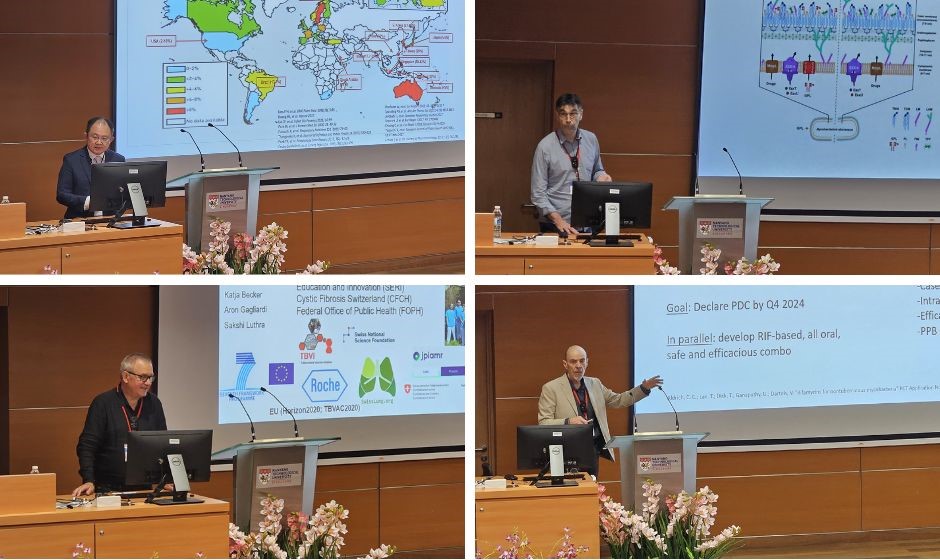 Presentations on NTM pulmonary diseases phenotypes by [clockwise] Prof Albert Lim (Tan Tock Seng Hospital, Singapore); Prof Laurent Kremer (Université de Montpellier); Prof Thomas Dick (Center for Discovery and Innovation, Hackensack Meridian Health); and Prof Peter Sander (Institute of Medical Microbiology, University of Zurich), respectively.
Presentations on NTM pulmonary diseases phenotypes by [clockwise] Prof Albert Lim (Tan Tock Seng Hospital, Singapore); Prof Laurent Kremer (Université de Montpellier); Prof Thomas Dick (Center for Discovery and Innovation, Hackensack Meridian Health); and Prof Peter Sander (Institute of Medical Microbiology, University of Zurich), respectively.
The second day of the symposium focused on NTM, whose pulmonary disease phenotypes and acquired drug-resistance mechanisms were introduced by Prof Albert Lim (Tan Tock Seng Hospital, Singapore) and Prof Peter Sander (Institute of Medical Microbiology, University of Zurich), respectively. The novel therapeutic strategies and inhibitors presented by academic and pharmaceutical teams were impressive and give hope for new anti-NTM treatments. Dr Priya Ragunathan (NTU School of Biological Sciences) shed light on the importance of the respiratory complexes of the pathogens to form the energy of life, ATP. Atomic insights combined with in silico approaches to provide new avenues to identify new targets and compounds for the development of novel antibiotics were presented by Dr Vikneswaran Mathiyazakan (NTU School of Biological Sciences).
A symposium can only be vibrant, if it goes along with fantastic posters, where young and experienced scientists present and discuss their excitements. Out of all the insightful posters at the symposium, the three best posters were awarded by Prof Peter Sander to Dr Amaravadhi Harikishore (School of Chemistry, Chemical Engineering and Biotechnology, NTU), Dr Sakshi Agarwal (A*STAR Infectious Diseases Labs, Singapore) and Dr Ashwani Kumar (CSIR-Institute of Microbial Technology, India). The prizes were sponsored by the Institute of Advanced Studies (IAS@NTU).
The symposium was jointly organised by Prof Dr Gerhard Grüber and Prof Dr Thomas Dick, members of TELMabNet (Targeting energy of life for the development of drug combinations to eradicate antibiotic-tolerant Mycobacterium abscessus (a clinical nightmare) Network), an excellence cluster funded by the Singapore National Research Foundation, with support from IAS@NTU. We extend our heartfelt gratitude to all the participants, speakers and organisers for their invaluable contributions in making this Symposium a success.
-with-our-prize-presenter-prof-peter-sander.jpg?sfvrsn=b0ce9a15_1) Prof Peter Sander (Institute of Medical Microbiology, University of Zurich) presented the poster awards to the winners, Dr Sakshi Agarwal, Dr Ashwani Kumar and Dr Amaravadhi Harikishore.
Prof Peter Sander (Institute of Medical Microbiology, University of Zurich) presented the poster awards to the winners, Dr Sakshi Agarwal, Dr Ashwani Kumar and Dr Amaravadhi Harikishore.
Some reflections by the poster award recipients:
"Many thanks to the organisers and IAS@NTU for making this event a success. This symposium has provided invaluable insights from world-leading experts in the field. The presentations on mycobacteria illustrate how we can persevere and succeed despite life’s challenges. I now have a deeper appreciation for the sophisticated strategies mycobacteria employ to hijack the human immune response and thrive even under adverse conditions. Participants were able to network and meet their dream leaders, engaging in meaningful conversations with those they hope to collaborate with in the future. They proudly presented their work and received invaluable feedback and experience through these interactions. This symposium has provided opportunities to learn about fellow researchers' work from various countries, opening collaborative possibilities at an international level." - Dr Amaravardhi Harikishore (Research Fellow, CCEB NTU)
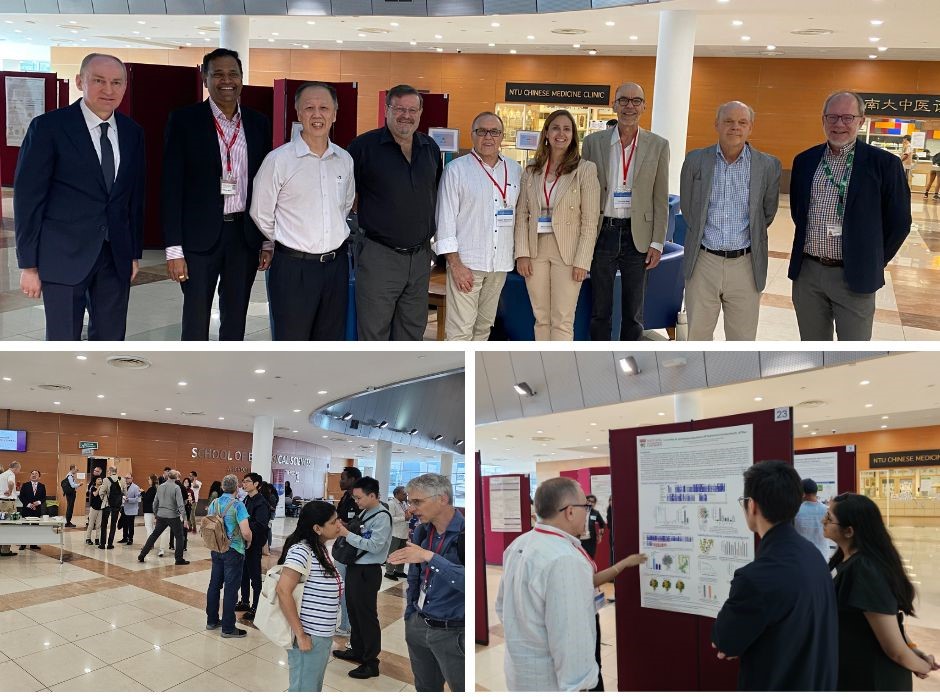 [Top] Group photo with the Associate Vice President Research, Dean of the CoS, Chair of SBS, CEO of EDDC, NTU faculty, CEO and CSO of NHP Inc. and the organisers; [Bottom] Participants delving into groundbreaking research findings, showcasing innovation and collaboration in action.
[Top] Group photo with the Associate Vice President Research, Dean of the CoS, Chair of SBS, CEO of EDDC, NTU faculty, CEO and CSO of NHP Inc. and the organisers; [Bottom] Participants delving into groundbreaking research findings, showcasing innovation and collaboration in action.
Feedback from some participants:
“This enticing two-day symposium was an exciting opportunity for budding researchers who wished to expand their network and develop knowledge about TB and NTMs. It was a platform for young scientists like myself, to learn and gain more exposure about novel research conducted in the field.” - Svarika Sonthalia (Undergraduate, SBS NTU)
“The symposium featured an exciting panel with a diverse range of expertise which allowed for a holistic outlook. The additional attractive element was the careful planning to allow researchers of all levels to showcase their work which in return paved way for interesting exchange of ideas and collaborations." - Dr Vikneswaran Mathiyazakan (Research Fellow, SBS NTU)
“I very much enjoyed the symposium, the people, the scientific exchange with advanced and early career scientists and the interaction outside the scientific program.” - Prof Peter Sander (University of Zurich)
“The symposium was an enriching learning experience, offering in-depth insights into the latest research and innovative strategies for addressing TB and NTM. The diverse perspectives shared by speakers and participants from around the world made for a dynamic and engaging event." – Vandana Grover (Undergraduate, SBS NTU)















/enri-thumbnails/careeropportunities1f0caf1c-a12d-479c-be7c-3c04e085c617.tmb-mega-menu.jpg?Culture=en&sfvrsn=d7261e3b_1)

/cradle-thumbnails/research-capabilities1516d0ba63aa44f0b4ee77a8c05263b2.tmb-mega-menu.jpg?Culture=en&sfvrsn=1bc94f8_1)





